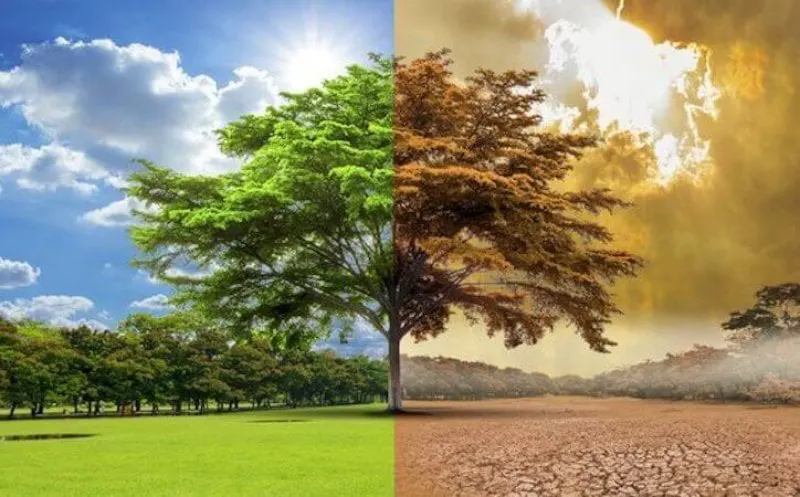Viewpoint: Turning farms into carbon repositories can’t stave off ‘climate catastrophe’
Viewpoint: Turning farms into carbon repositories can’t stave off ‘climate catastrophe’


In late June, overlooked amid pandemic, economic crisis, and protest headlines, a bipartisan cohort of United States senators introduced a bill to establish a U.S. Department of Agriculture, or USDA, certification program, helping farmers and forest landowners participate in carbon credit markets. The bill’s sponsoring politicians ranged from Rhode Island Democrat Sheldon Whitehouse to South Carolina Republican Lindsey Graham.
But the diverse set of interest groups that proudly pasted their logo to the bill’s one-pager was even more striking. The collage featured traditional agribusiness giants like McDonald’s, Cargill, Syngenta, and Land O’ Lakes, corporate lobby groups like the National Milk Producer’s Federation and The American Farm Bureau Federation, and also conservationists like The Nature Conservancy, The American Farmland Trust, and the Citizen’s Climate Lobby. The bill’s most conspicuous private-sector supporter is Microsoft, which announced in January it intended to become “carbon negative” by 2030.
…
It all sounds too good to be true—and it is. While support for soil carbon is forging unprecedented partnerships, its scientific basis is collapsing. A comprehensive feature on the subject by Gabriel Popkin in Yale E360 emerged this spring; two months later, Mother Jones editor Maddie Oatman penned a similar investigation. Their findings were clear: The science of soil carbon, to put it literally, lacks depth.
Read the original post

 | Videos | More... |

Video: Nuclear energy will destroy us? Global warming is an existential threat? Chemicals are massacring bees? Donate to the Green Industrial Complex!
 | Bees & Pollinators | More... |

GLP podcast: Science journalism is a mess. Here’s how to fix it

Mosquito massacre: Can we safely tackle malaria with a CRISPR gene drive?

Are we facing an ‘Insect Apocalypse’ caused by ‘intensive, industrial’ farming and agricultural chemicals? The media say yes; Science says ‘no’
 | Infographics | More... |

Infographic: Global regulatory and health research agencies on whether glyphosate causes cancer
 | GMO FAQs | More... |

Why is there controversy over GMO foods but not GMO drugs?

How are GMOs labeled around the world?

How does genetic engineering differ from conventional breeding?
 | GLP Profiles | More... |

Alex Jones: Right-wing conspiracy theorist stokes fear of GMOs, pesticides to sell ‘health supplements’




 California, Washington, Oregon forge immunization alliance to safeguard vaccine access against federal undermining
California, Washington, Oregon forge immunization alliance to safeguard vaccine access against federal undermining Trust issues: What happens when therapists use ChatGPT?
Trust issues: What happens when therapists use ChatGPT? Fighting deforestation with CO2: Biotechnology breakthrough creates sustainable palm oil alternative for cosmetics
Fighting deforestation with CO2: Biotechnology breakthrough creates sustainable palm oil alternative for cosmetics Viewpoint — Fact checking MAHA mythmakers: How wellness influencers and RFK, Jr. undermine American science and health
Viewpoint — Fact checking MAHA mythmakers: How wellness influencers and RFK, Jr. undermine American science and health 30-year-old tomato line shows genetic resistance to devastating virus
30-year-old tomato line shows genetic resistance to devastating virus Viewpoint: Video — Big Solar is gobbling up productive agricultural land and hurting farmers yet providing little energy or sustainabilty gains
Viewpoint: Video — Big Solar is gobbling up productive agricultural land and hurting farmers yet providing little energy or sustainabilty gains The free-range chicken dilemma: Better for birds, but with substantial costs
The free-range chicken dilemma: Better for birds, but with substantial costs ‘You have to treat the brain first’:Rethinking chronic pain with Sanjay Gupta
‘You have to treat the brain first’:Rethinking chronic pain with Sanjay Gupta
